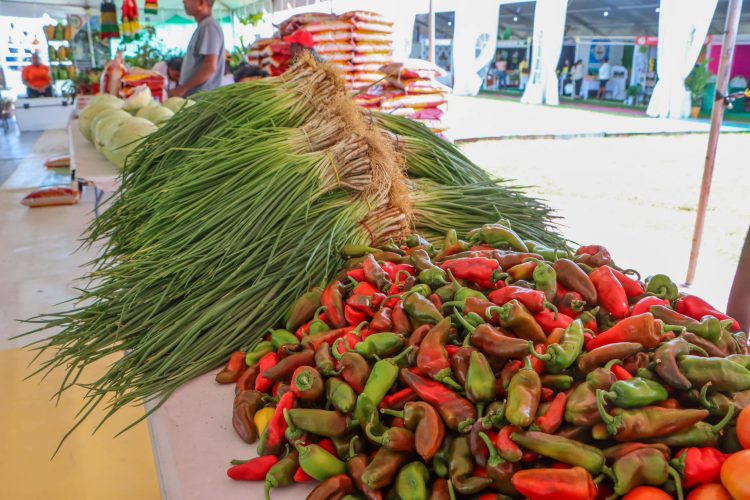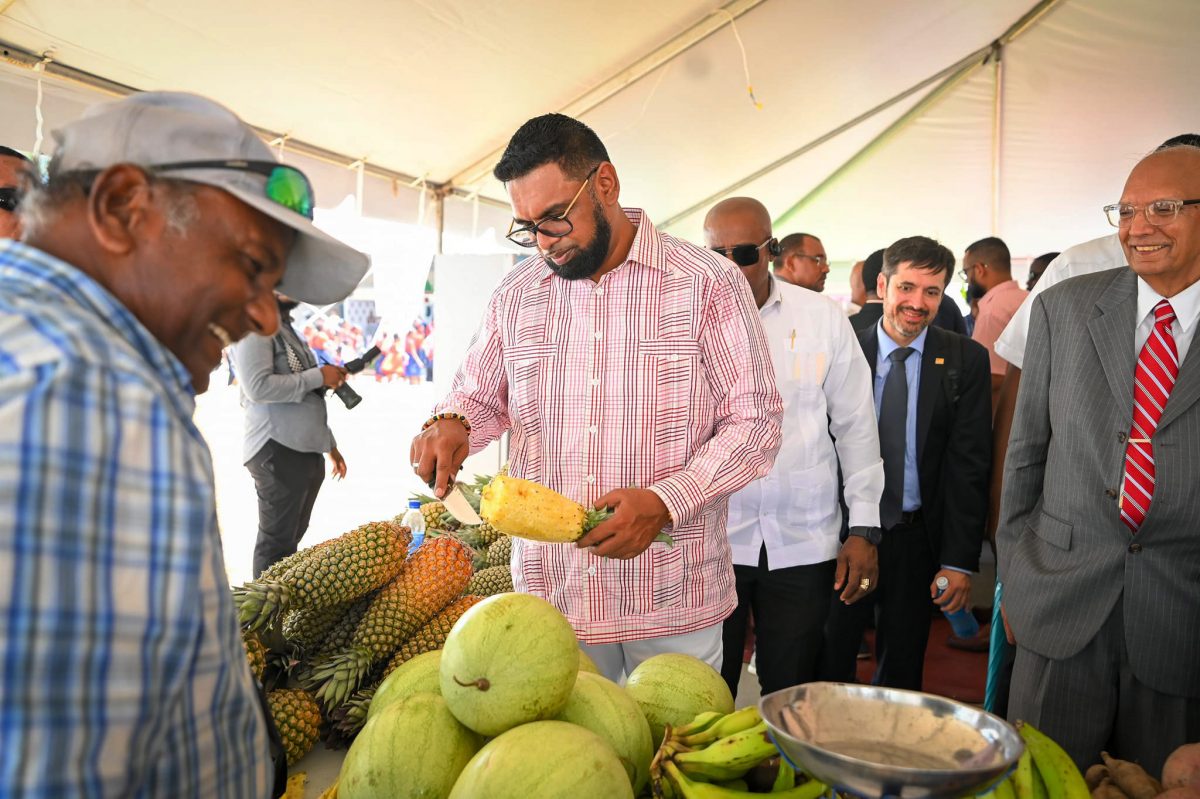Opening the Agri Investment Forum & Expo yesterday, President Irfaan Ali announced that Guyana and Canada will partner to create 3,000 innovative jobs here especially for the younger generation as he pushed the importance of science and technology in developing agriculture.
Speaking at the Arthur Chung Conference Centre, Ali said, “We are going to launch a programme where we want to have at least 3,000 of our young people in these innovative jobs in the coming years and Canada and Guyana will partner in developing the framework to provide the training to have our young people in these innovative jobs in the technological field.”
During his speech, Ali who returned on Thursday from a CARICOM-Canada summit in Ottawa, said the goal is to position Guyana in the world 2030 and beyond as a global leader on climate change, food security and energy security.

According to the President, following his recent visit to Costa Rica, it was agreed that young people from CARICOM will be going to the regional headquarters of the Inter-American Co-operation on Agriculture (IICA) “to be trained in their innovation centre and their centre of excellence to come back here in Guyana.”
He said, IICA and the Government of Guyana have agreed that they will develop the centre of excellence to educate and train the country’s young people in the field of agriculture here in Guyana for across the region.
“The Guyana School of Agriculture will be transformed into IICA Guyana Centre of Excellence for studies in the field of agriculture focusing on innovation and resilience”, he said.
Ali stated that the country is also working with Cuba, adding that he has made it very clear that he does not want any “studying relationship with anyone anymore” instead they are working to develop the honey industry.
A team which was present at the forum from Cuba will be working with the indigenous communities and communities where there are mangroves and on the highway so that Guyana can become a major producer of honey.
“Because of the variation of our forest, our citrus cultivation, our mangrove, it is a different quality of honey, in the industry. Black mangrove honey carries a different price from citrus honey”, he noted.
Against this backdrop, the president said that they will be incorporating training for the graduates of the University of Guyana and the Guyana School of Agriculture so that they are not finishing their studies looking for jobs but rather “coming out creating opportunities, creating jobs, creating wealth for yourself and the community in Guyana.”
Situation room
Meanwhile, the president said that in the coming months, IICA and Guyana will also be setting up a “regional situation room” that will provide real time data. He explained, “It will be the development of a Caricom situation room that will give real-time data to our farmers to allow evidence-based decision-making and more proactive planning in terms of our crop development… So that is another major initiative that Guyana will be leading the development of a regional situation room.”
Information sharing platform
Ali also took the opportunity to point out that today food production and agriculture are changing globally, saying that “it is no longer guesswork” but rather precise science based on analysis of data and the timely dissemination of information. As such, he said that merely relying on extension officers to go to fields and to meet communities can no longer work given the opportunities technology provides.
“We have recognized this in the government. We have recognized that technology gives us the opportunity to connect the farmers directly with extension officers instantaneously, and part of the innovative investment that we will make here in Guyana is to create a proactive information sharing and response platform which will be available to our farmers across the country”, he declared.
He said that not only when farmers need information or when they need data, but as data is analyzed the information platform will be used to disseminate the information to farmers instantaneously “bringing them up to date and keeping them aware with what is going on.”
Stressing that information is key to the transformation, Ali said, “We’re going to make that investment in creating this information platform” so to bridge any gap between farmers and extension officers connecting them instantly and directly through technology.
The President then pointed out that that is why the drive through the office of the prime minister and vice president in digitization is key and critical for the transformation of Guyana.
“I said it before, the government has said, the next seven years is about making key investments that are so critical for our competitiveness. So digitization and part of the digitization effort involves agriculture, infrastructure management, asset management… So innovation and digitization is a key strategy towards the 25 by 2025 (reduction of food imports) and towards a sustainable and resilient agriculture development”, he told the audience.
In addition to this, Ali stated that they are also working on the regional food hub and on the issue of finance and insurance he said Guyana has found many innovative models over the last three years to support farmers under very difficult conditions.
He pointed out that for poultry farmers because of innovative policies for the banking sector the government was able to reduce the interest rate for loans to the sector by two to four percentage points.
“That is because of an innovative approach… We can’t continue to complain about the issue of insurance. We have to come together to find a solution. How can we bring the insurance company together and develop a fiscal regime? How can we develop incentives to them that mitigate the risks and the vulnerability as a result of climate events so that they can offer insurance to the farmers at an affordable rate? We need to lock ourselves in a room and come up with that innovative model that will present a solution to the farmers”, he declared.
Banking sector
Detailing projects that the government has been investing in to improve food security and push young people and women into agriculture, Ali stated that the link between policy formulation and investment is necessary. He said, “The private sector has to be motivated to invest in agriculture. Unfortunately, our banking sector lacks the internal drive and the internal commitment to food security in the region and I say so not because we want to pick a fight with the banking sector. But because I believe the banks across the region can do much more and should do much in supporting food production, agriculture and our farmers.”
Nevertheless, Ali commended the local banking sector stating that because of the policy formulation and the direction of the government “when you look at our investment in agriculture over the last three years, our resource allocation to agriculture and farmers increased by over 300% to more than $33 billion.”
As such, Ali said that following this, there was an increase in lending by the local banking sector by 61%, “61% increase in their lending to agriculture and food production.”
“This tells a story that both in the public and private sector there is great confidence in what we’re doing in relation to the 25 by 2025 and in relation to the food production plan, and we are totally committed to the task of ensuring our food system is built in a strong and sustainable way”, he stated.
Homing in on the younger generation, Ali said that they would have greater access to land, however, he said that something he will keep saying is that the modern way of producing food will not require an individual to own 500 acres of land and 1000 acres of land, as a matter of fact, Ali said the country does not have “that land anymore along the coast.”
This, he said was a reality that is facing the country with “our whole urban and semi urban and rural development… going through a rethinking phase because the land resources on the coast is a finite quantum” and that he said is why innovation must be a part of what is being done.
“So the production of bell peppers that you could get on 10 acres of land in one acre, in one acre of shade house, you can get the same production”, he said.
Ali disclosed that the government is also looking at a “special scheme” through which young people can have some land available to them hence massive investment is being made in new roads and infrastructure to open up new lands to be deployed into the production and productive capacity.
Ali said the country is moving closer and closer in realizing that by 2025, it will be fully self-sufficient in the production of corn and soya. He said the vision is not only to be sufficient for Guyana but rather they are looking ahead “with DR (Dominican Republic) and CARICOM this is a $1B market annually, a $1B market” with the demand for corn being over one million tons and the demand for soya being about 600,000 tons. “Our aim is to develop our corn and soya industry to take a great part of this market in the DR and CARICOM”, he added.





